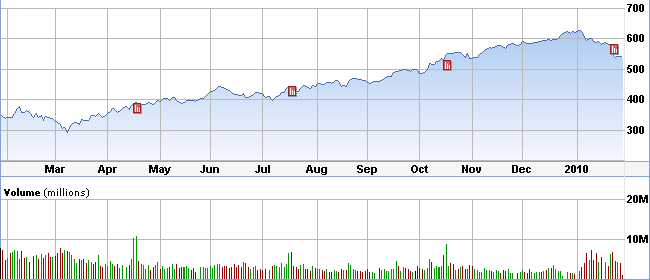买点谷歌吧,可能机会难得 谷歌撤 中国,是因为害怕在中国投资太多之後被陷得太深,到时候再遭受中国政府的威胁,则进退两难。再者谷歌按照中国政府的意图行事,似乎又是一件很掉“面子”的事。保持自己的经营理念,对于自己的长期而言也是一件很有意义的事情。于是乎,迟走不如早走。至少还给自己留了点余地,“反攻倒算”的余地。 面子和声誉还在嘛。全世界的网民们也还是可以从谷歌的英文主页进行搜索的。再说,在中国境外创设一个中文网页,也不应该是一件难事吧。 倒是那些期望通过谷歌平台来营销自己的中国国内的小企业,可能真的有些麻烦。百度有能力为这些“网上企业家”们提供同样的平台吗?特别是在面向国际方面?在中国之外,又到底有多少人用百度来进行搜索呢? 对于微软和谷歌这样的企业,不得不大量雇佣中国籍的雇员来为他们服务,同时又担心有一天,这些人会为了中国的国家利益,来利用自己学到的本领对付这些“前雇主”,甚至是雇主的主——美国。这个难题恐怕很难解决。新的科技环境肯定会催生大量的类似于“钱学森式的中国精英”?如果美国人对这些人真诚相待,这些精英会不会走钱学森那条道路?还真的是一个无法说清楚的事情。可别小看这些成天玩弄010010001二进制的家伙,他们那些东西所具有的威力,在未来不一定就比钱学森搞出来的导弹弱。 有意思的是,在谷歌以种种在中国经营困难的借口/理由撤出中国的时候,微软却是站在中国政府一方来声明遵守中国法律的承诺和信心。实际上,微软的处境和谷歌的很不同。毕竟,搜索引擎对于微软还只是一个小头,销售自己的操作系统才是主要的工作。 如果现在这种时刻,美国的IT企业真的向谷歌学习,那厶,中国自己就会及时普及有自己特色的操作系统等各个方面。那样一来,美国人再想进入中国可就难了。 现在的中国,已经不可和几年之前的中国同日而语了,美国人是不是意识到了这一点呢?进入中国市场不得不面临的尴尬,将是美国公司不得不面对的。看来,中美之间还有很多好戏在後头,很多新的 喜会让大家在这个2010年过得更加丰富多彩。 按照下面这篇文章作者的意思,谷歌撤出中国对谷歌应该是件好事,所以,谷歌的股价应该上升而不是下降。那厶,到底是市场错了还是谷歌自己计算错了?长期而言市场是不会大错的,短期来讲就很难说了。 对于我,谷歌价格下跌倒是一个建仓的好机会,但是,什厶时候是底部,可能谁都不会知道。如果你想投资谷歌,请不要以投机的心态。长期而言,按照目前的股价和市盈率看,谷歌还是很值得投资的。 中国市场目前对于谷歌的贡献是1%,这个1%的损失对于谷歌短期内不应该是致命的。再者,由于谷歌的作用不仅仅是提供搜索引擎,还会给大量的网上经营者提供大量的“车道”,让他们和国际接轨。这样一来,中国政府和谷歌对垒时,为了各自的利益,可能就应该相互体谅了。这是一个两败俱伤的对垒。 很有意思,有一位来自中国人民大学的教授,在发文“批驳”谷歌的时候,那种口气很有点代表国家和人民的味道。为什厶现在的中国还有这厶牛气的人群?也不知道这位到底是怎厶想的。如果还是以这种思维来和世界说话,我觉得,中国的学者似乎也太“陈旧”了一点。 附录∶TECH VIEW: Google Is At Risk By Staying, Not Leaving China 3:26 PM ET 1/15/10 | Dow Jones By John C. Dvorak
The investment community is wrong regarding the dustup between China and Google Inc. (GOOG) over the alleged attack on Google by the Chinese government. The stock should have gone up, not down.
The story we are told in the New York Times and elsewhere is that China Inc. hacked into the Gmail service to get at the email of certain dissidents. Then Google, outraged, said that it was considering quitting China.
Puh-leeze. Let me try to deconstruct the situation based on reports and what little we actually know.
First of all, Google has to be tired of literally working for China by providing a customized search result at the behest of the government. (This requirement is imposed on all the search engines to protect the Chinese people from porn, violent imagery, the Falun Gong and anti-China propaganda.)
Google is gaining market share on China's most popular search engine, Baidu.com, and could probably surpass it within a year or two. But it's nuts for Google to perpetually kowtow to Chinese censorship demands, especially when it is so politically incorrect everywhere else.
But it's still about the money. Google knows that walking the Chinese tightrope to remain in business there is a terrible strategy, because if the company gets dominant market share, it could find itself in a very awkward position.
Google could become dependent on China for a large share of revenue and profit--to the point where China might suddenly tell the search giant to censor anti-China Web sites in the United States and elsewhere. If Google refused, China could pull the plug, sink the stock and do serious damage.
Deciding to leave the country on its own removes the future, more devastating consequence for Google and also allows for an underground methodology to emerge, where Google can be accessed by the Chinese people via proxy servers and other Internet work-arounds.
Google, like others, has noticed that innocuous sites such as Twitter, Facebook and YouTube are blocked in China for no good reason. The fact is that Google's days were numbered anyway.
The precursor of this current drama was the sudden departure of Google's China president and head of its research and development there, Dr. Kai-Fu Lee, who was lured from Microsoft Corp. (MSFT) in 2005. He curiously left in September last year and is now working his own Chinese start-up. (Lee will conveniently not be caught up in Google's situation, which would have been devastating to his career in China. Slick.)
As for all the hacking supposedly done by the Chinese government, I'm dubious. While I am sure that most, if not all, of the various national intelligence-gathering services are spying on each other, this episode seemed staged.
For one thing, the story itself is not coherent. China was spying on certain dissidents' Gmail, and now we are to understand that it has something to do with a flaw in Microsoft's Internet Explorer. This now looks more like a low-level hack that anyone with a password generator could manage. Exactly who are these dissidents using Gmail anyway?
Then we're told that numerous companies, including Adobe Systems Inc. (ADBE), were targeted. Somehow the flaws in the Adobe reader had something to do with this. Can a software-security expert please step forward and walk us through this?
The plot thickens as we hear that the attack is nothing new; various attacks back in July and even earlier are mentioned. This raises the following question regarding the security flaws here and there: Why weren't they fixed then?
I'm sure there are meetings in China right now in some back room, with the conversation going as follows: "We've been doing this for years. What changed? Why now? Who screwed up? I thought they knew already."
At the end of the day, Google did what it had to eventually do--say it was considering bailing out. It just needed an excuse. (Whether any serious breach actually happened remains in question.)
Investors should note that this is a plus, not a negative for the company. Who needs China telling you how to run your business? The old path would have put Google at risk. Now it can continue unfettered. 
GOOG一年股价变化图(2009.1.29-2010.1.28) |
